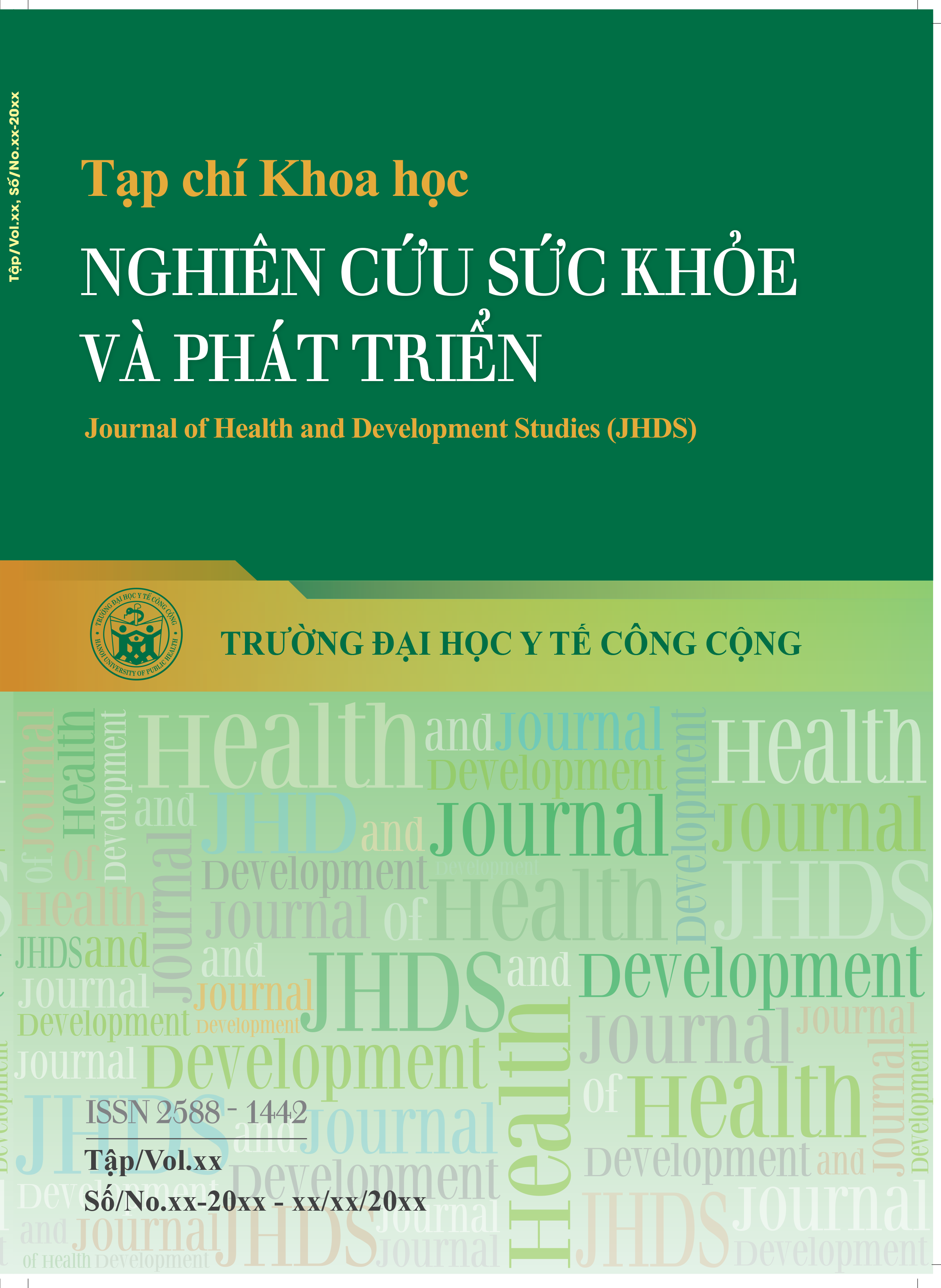Tạp chí
Khoa học Nghiên cứu Sức khỏe và Phát triển
(Journal of Health and Development Studies – JHDS)
Trường Đại học Y tế công cộng
ISSN (Print): 2588-1442
ISSN (Online): XXXX-XXXX
https://jhds.edu.vn
Stress among clinical nurses and affecting factors at Military Hospital 120, Tien Giang Province, year 2023
- Mã bài báo : SKPT_24_049
- Ngày xuất bản : 30/08/2024
- Số trang : 54-63
- Tác giả : Hua Thanh Thuy
- Lượt xem : ( 289 )
Danh sách tác giả (*)
- Hua Thanh Thuy 1 - Hanoi University of Public Health
- Le Van Hoi 1 - Military Hospital 120
- Hoang Khanh Chi 2 - IRD Vietnam
Objectives: This study aims to determine the degree of work-related stress among clinical nurses and analyze some factors affecting clinical nursing stress at Military Hospital 120, Tien Giang province, in 2023.
Methods: This study employed a cross-sectional design with quantitative and qualitative
research. The quantitative research is conducted by surveying 159 clinical nurses using the validated DASS-21 scale. The qualitative study was conducted through 04 in-depth interviews and 1 focus group discussion with stakeholders to analyze the factors affecting nursing stress.
Results: 17.6% of clinical nurses suffered from stress, with breakdowns indicating 9.4% experiencing mild, 3.8% moderate, and 4.4% severe stress levels. Notably, departments such as the Emergency Department, Psychiatry, and Intensive Care exhibit higher rates of nurses displaying signs of stress. Factors such as elevated work pressure, unclear job assignments, and work instability were associated with negative impacts on stress levels. Conversely, the hospital's salary and welfare policies, as well as planning and staff development strategies, displayed positive influences on the stress experiences of clinical nurses.
Conclusions: Addressing the specific needs of female, elderly, and underprivileged nurses, particularly those in high-stress departments like Emergency, Intensive Care, and Psychiatry, is crucial. It is recommended that the hospital continues its initiatives related to salary and incentives, and staff planning while implementing tailored human resource strategies to optimize workforce allocation, clarify job roles, and organize work assignments logically and promptly.
- DOI : https://doi.org/10.38148/JHDS.0804SKPT24-049
- Chủ đề : Mô hình sức khỏe, ốm đau, bệnh tật, chất lượng cuộc sống
- Loại bài báo : Nghiên cứu gốc
- Chuyên nghành : Chuyên Ngành Y
 Thông tin liên hệ : Hua Thanh Thuy
Thông tin liên hệ : Hua Thanh Thuy Email : htt@huph.edu.vn
Email : htt@huph.edu.vn Địa chỉ : Hanoi University of Public Health
Địa chỉ : Hanoi University of Public Health
- Từ khóa :
- Clinical nurses
- hospital
- mental health
- stress.
Bài báo liên quan
- Care competencies of nurses at clinical departments: A cross-sectional study in Bac Giang provincial general hospital of Vietnam
- COVID-19 pandemic experiences and psychological well-being of a Vietnamese university student sample in Hanoi, Vietnam
- Association between performance status and Quality of life in advance stages non-small cell lung cancer patients
- Direct medical costs among patients with type 2 diabetes mellitus with complications at Thieu Hoa District General Hospital, Thanh Hoa province, Vietnam in 2023
- Risk Factors for Anxiety Disorders among Men Who Have Sex with Men (MSM) in Vietnam
- Knowledge and practice on using single-use plastic products of rural residents in Binh Luc district, Ha Nam province in 2022
- The health seeking behavior of the elderly in a coastal town in Vietnam and some related factors in 2023
- A review on hand hygiene complicance by medical staff of hospitals worldwide
- Quality of life among children with Multisystem Inflammatory Syndrome (MIS-C) at Vietnam National Children’s Hospital in 2022: A Case series study
- Stress among clinical nurses and affecting factors at Military Hospital 120, Tien Giang Province, year 2023
- Related factors of nurses’ working motivation at Hanoi Medical university hospital in 2024
- A case study about the implementation of the regulation on prescription for health insurance out-patients in a general hospital in Vietnam, 2022
- Surgical hand hygiene compliance and its associated factors among medical staff at Hospital 199, Da Nang city, 2022
- The status of work motivation of nurses at Hanoi Medical University hospital in 2024
- Status of vegetarianism and related factors among college students in Hanoi in 2023
Bài viết mới nhất
- Một số trang web hữu ích đối với các nhà khoa học
- Dành cho chuyên gia
- Tạp chí Khoa học Nghiên cứu sức khỏe và Phát triển duyệt tối đa 1,0 điểm ngành Y trong Danh mục Tạp chí khoa học được tính điểm của Hội đồng giáo sư Nhà nước
- CHÚC MỪNG NGÀY BÁO CHÍ CÁCH MẠNG VIỆT NAM (21/6)
- GS.TS Hoàng Văn Minh - Hiệu trưởng Nhà trường 'lọt top' nhà khoa học có chỉ số trích dẫn hàng đầu thế giới

 File toàn văn
File toàn văn